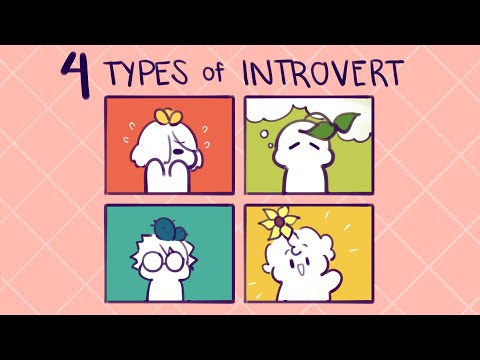The 4 Types of Introvert: Which Are You?
Introverts tend to be quit, reserved, and introspective. Unlike extroverts who gain energy from social interaction, introverts have to expend energy in social situations. After attending a party or spending time with a large group of people, introverts often feel the need to "recharge" by spending a period of time alone.
Signs Of Introverts
- They Enjoy Solitude
- Need quiet to concentrate
- Are self-aware
- They Take time making decisions
- They Don't like group work
- They Like to Learn by Watching
- They Prefer to write rather than talk
- They Feel tired after being in a crowd
- They Have few friendships, but are very close with these friends
- Daydream or they use their imaginations to work out a problem
Causes
In order to understand why some people are introverted and some are extroverted, it is important to understand the role that your body's physiology plays. The way your body responds to the external environment plays an important role in determining your level of extroversion and introversion. The brains of these two personality types work a little differently from each other. Researchers have found that introverts have higher blood flow to the frontal lobes than extroverts. This part of the brain helps you remember things, solve problems, and plan for the future.
Introverted minds also react to dopamine differently than extroverted brains. This is a chemical that activates the reward-seeking part of your brain. Introverts and extroverts have the same amount of the chemical, but extroverted minds get an enthusiastic buzz from their reward center. On the other hand, introverts tend to feel overwhelmed by it.
Types Of Introverts
1. Social introvert
It's easy to confuse a social introvert with someone who deals with social anxiety, but it's different: "Social introverts don't avoid crowds because of anxiety but rather avoid [because of] their preference. The most comfortable and happy is either in complete solitude or in small groups in quieter places.
- Prefer tiny intimate gatherings
- Require alone time to recharge, especially in a relationship
- Will accept social invitations with no intention to show up
- Will happily go on a solo date or vacation
2-The Thinking introvert
The thinking introvert will often pause to cogitate before offering a response to a question. "Let me think about that" can be a very common response for the thinking-type introvert. Introverts of this type are prone to getting lost in their thoughts and may actually mentally "disappear" from conversations due to a retreat into the mental world.
- Generally not reactive and will often pause to think before offering a response to a question
- Super self-aware
- More introspective than the average introvert
- Will lean toward activities that provide a "mental haven" for thinking: studying, reading, researching, musical pursuits, or other creative activities
Read Also: 5 Effective Ways To Set Boundaries As An Introvert
3- Anxious Introverted.
Anxious introvert is often quiet and may appear on edge or irritable. This type of introvert shrinks away from people and places that may heighten anxiety. An “anxious” introvert can be very avoidant and even seem rude, yet the “turning in” behavior is just a protective defense mechanism at work.
- They often feel awkward or shy around people.
- Typically appear at least mildly nervous in most situations
- May appear highly avoidant and rude
- Will avoid social interactions at all costs
4-Restrained/Inhibited Introverts.
"The restrained introvert tends to be reflective and even plodding in nature. Often unemotional, this type of introvert is often very controlled and may have very grounded energy," Manly says. "This type of introvert is often steadfast and very rock-like in nature. The restrained-type introvert is often the quiet, dutiful person that others tend to rely on."
- They take longer to take an action
- Move at a slower, more methodical pace in all things
- Tend to enjoy predictable activities
- Often unemotional



No comments
Post a Comment